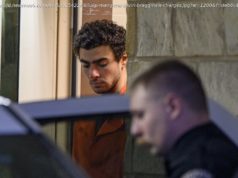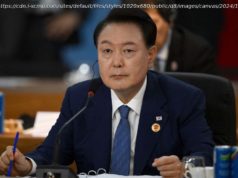The federal judge in Virginia suggested that the special counsel charged Paul Manafort, the former Trump campaign chairman, to pressure him into incriminating the president.
WASHINGTON — A federal judge in Virginia sharply challenged the special counsel’s case against Paul Manafort on Friday, suggesting that prosecutors had pursued fraud charges in hopes of gaining evidence that might incriminate President Trump or even topple him from office.
“You don’t really care about Mr. Manafort’s bank fraud,” Judge T. S. Ellis III said during a court hearing in Alexandria, according to published reports. “You really care about getting information that Mr. Manafort can give you that would reflect on Mr. Trump and lead to his prosecution or impeachment or whatever.”
Mr. Trump immediately seized upon the judge’s comments as proof that the special counsel is out of control. In a speech on Friday afternoon to the National Rifle Association in Dallas, he cited the judge’s critique. “I’ve been saying that for a long time,” he said. “It’s a witch hunt.”
He described the judge as “very special” and “highly respected,” and Mr. Manafort, who served as his campaign chairman for five months, as “a good person” who worked for him only briefly.
The judge’s unfriendly reception was a new turn of events for Mr. Mueller’s team, which has faced little or no confrontation during court hearings. Other Americans charged by the special counsel have pleaded guilty and most have agreed to cooperate with the prosecutors. But Mr. Manafort has mounted a vigorous defense against financial fraud and other charges, contending that Mr. Mueller has gone beyond his mandate.
Judge Ellis, 77, who was appointed to the federal bench in 1987 by President Ronald Reagan, seemed sympathetic to that argument. He said that the criminal activity described in the indictment “manifestly has nothing to do with the campaign” or Russian interference in the 2016 presidential election. Some of the allegations, he noted, date to 2005 and 2007.
“I don’t see what relation this indictment has with what the special counsel is investigating,” he said during an hourlong hearing on a defense motion to dismiss the charges. “I’m sure you’re sensitive to the fact that the American people feel pretty strongly about no one having unfettered power.”
Mr. Mueller was appointed a year ago by the deputy attorney general, Rod J. Rosenstein, to investigate Russia’s election interference, possible links to the Trump campaign and “federal crimes arising from the investigation of these matters.”
Michael Dreeben, a prosecutor in the special counsel’s office, told the judge that Mr. Manafort’s financial ties with people in Russia and Ukraine fell in the scope of Mr. Mueller’s jurisdiction. “We followed the money,” he said.
Judge Ellis, who did not issue a ruling, acknowledged that prosecutors often hope to turn defendants into witnesses who can give evidence more important targets. “The vernacular is ‘to sing,’” he said, or “tighten the screws.”
But he questioned why the special counsel’s team had pursued the charges against Mr. Manafort when it had referred allegations about the president’s personal lawyer, Michael D. Cohen, to federal prosecutors in Manhattan.
“Why in New York did you feel it was not necessary to keep that, but it was necessary to keep this bank fraud?” he asked.
He suggested that the United States attorney’s office for the Eastern District of Virginia might take over the prosecution. At another point, he asked whether the special counsel’s office had already run through its $10 million budget.
The judge ordered prosecutors to give him a complete copy of an August memo in which Mr. Rosenstein outlined the authority of the special counsel. Mr. Rosenstein has specifically authorized Mr. Mueller to investigate allegations that Mr. Manafort, who lobbied for a pro-Russian political party in Ukraine, committed crimes involving payments from the Ukrainian government, according to the brief part of the memo that was made public when it was filed in court. Most of it was blacked out.
House Republicans allied with Mr. Trump have also sought a full version of the memo, the latest salvo in a tug of war with Mr. Rosenstein over records related to some of the Justice Department’s most politically charged investigations. The department has declined to hand over the document, citing a policy against sharing information on a continuing investigation.
The bank and tax fraud charges that Mr. Manafort faces in Virginia are rooted in the Ukrainian line of inquiry, as is a second indictment in the District of Columbia that accuses him of money laundering, failing to register as a foreign agent and making false statements to investigators. Mr. Manafort’s lawyers are seeking to dismiss those charges on the same basis.






